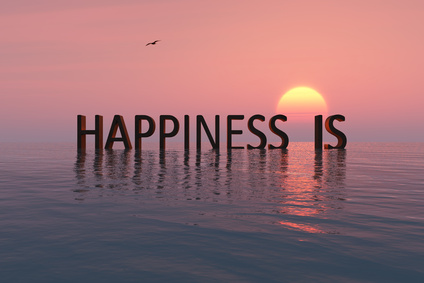I have a poster in my bedroom which says:
Happiness Live Much Laugh Often Love Well
But is it really that simple. How easy is it to be happy and what causes happiness?
As I started looking into this I came across some research by a Dr Robb Rutledge that I feel covers part of what happiness may be all about. He developed this mathematical formula:

What this means is that happiness depends on your expectations. More on the happiness equation here
Dr. Robb Rutledge who is a Senior Research Associate at the Max Planck UCL Centre for Computational Psychiatry and Ageing is undertaking research on the meaning of happiness. “Our mathematical equation allows the influences of past rewards and expectations to be combined to predict how happy someone will be. Our basic finding is that happiness depends not on how well things are going, but whether things are going better or worse than expected,”
Let me start with a situation that happened the other day that might explain this. My son wanted to go to Jamie Oliver’s restaurant to celebrate his 17th Birthday. To set the scene, we have tried 2/3 times to go to one of Jamie’s restaurants without success. My son is a foodie and an ardent follower of Jamie so was so excited at celebrating his birthday by eating in one of his restaurants. His expectation was very high that it was going to be the best experience, fantastic food, atmosphere, service etc. Everything would be at the highest level in his mind. So when things started to unravel and even though they were small things the excitement and happiness of the moment started to erode. The overall results fell short of what he expected and therefore rather than being happy his emotion turned to that of disappointment Rutledge’s equation can only calculate moment-to-moment happiness (as much as can be measured in a lab), and doesn’t even begin to capture what most people care about when it comes to happiness — and that is life satisfaction.
In a newspaper interview Rutledge said “We can’t really change how satisfied people are with their lives in the lab — that doesn’t even make sense. But we can understand what determines happiness from moment to moment, and we do think that there’s some relationship between
Experiment 1
In the first experiment Rutledge recruited 26 study participants and asked them to play a game in which they would either choose to earn a certain amount of money, or gamble with a chance to win or lose even more money. Every two or three games, researchers continually asked participants how happy they were at that moment.
After several games, the participants earned an average of £28.51 more than the initial £20 they earned just for showing up. But they reported more happiness per pound if the money they had won was a result of a gamble that turned out to exceed expectations
Rutledge was able to confirm his equation by hooking up the lab participants to MRI machines. The brain scans showed a lot of activity in an area of the brain called the striatum, which is linked to reward and expectations.
“We measured brain activity in this area during the experiment, added it up using the equations, and then predicted how happy people will be at any point,” explained Rutledge. “We’re hoping that this area of the brain might be the one that explains happiness, because it’s known to represent some of the variables in the equation.”
Experiement 2
Rutledge then wanted to see if the results from his lab experiments would hold in a more general population, so he designed a game included in the free smartphone app, “The Great Brain Experiment,” that mimicked the gambling tasks he used on participants in the lab. Like the lab tasks, it incorporated questions about happiness every two to three games, but it didn’t involve real money.
Rutledge analysed data from 18,420 people who made over 200,000 happiness ratings playing his smartphone game, and he found that players made the same kinds of decisions and reported the same levels of happiness that participants made in his lab — despite the fact that there was no real money involved. “Their happiness depended on their previous decisions and the outcomes of those decisions, in exactly the same way as the lab,” said Rutledge.
But before you resolve to permanently lower your expectations for everything, remember that we actually can get a pretty reliable happy feeling from high expectations. Consider the joy from booking a holiday, for example. “You shouldn’t have low expectations for your vacation, because you won’t be able to enjoy the pleasant anticipation that comes from knowing something good is going to happen,” Rutledge explained. The trade off comes, said Rutledge, if your expectations are so high that the trip ends up disappointing you”. And this is why the birthday dinner fell short.
So is the conclusion then that you want to have accurate expectations, because if you have accurate expectations you’ll make good decisions. And if you want to have more accurate expectations can hypnosis help you to connect and enhance those expectations. The answer of course is yes.
So let’s say you want to use this formula to make your family and friends happier. You find yourself being gushy and over the top about present you have bought. As you hand it to them you tell them they are going to love it, in fact it will change their lives, it is the best present ever.
Firstly, they won’t be able to anticipate it for more than two seconds, and then they’re more likely to be disappointed because you’ve just told them that this is going to change their life. Rather than make them happy you have just dulled their happiness levels. Now you get it, how easy is it to turn this around and with a little hynosis watch your happiness levels soar.
Depression and Happiness One of things that interests me most about Rutledge’s findings is the important implications for the study of depression. For instance, it’s already known that people with clinical depression don’t get as much pleasure from the things that other people get pleasure from and that people who suffer from depression respond to rewards and expectations in a different way.
Currently, Rutledge is applying his happiness equation to test people with depression and hopes to publish more research on the topic in the future. The current study was published online in the Proceedings of the National Academy of Sciences.

